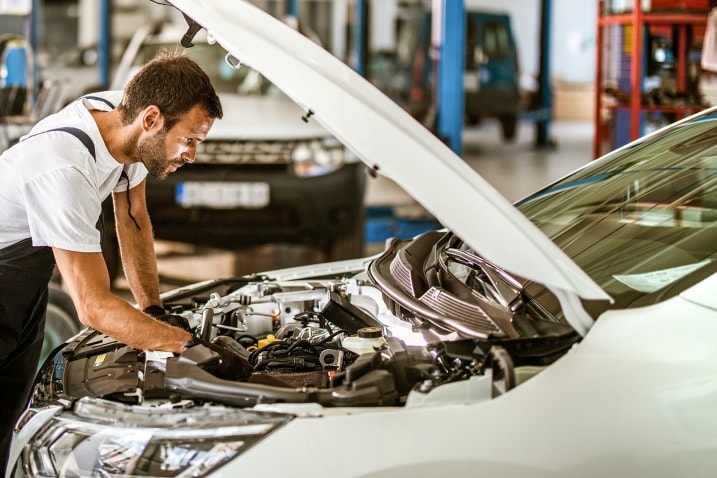All Categories
Featured
Your vehicle's engine is an intricate system that counts on several interconnected components to operate correctly. One of one of the most critical elements that ensures everything runs smoothly is the timing belt. Usually overlooked, the timing belt plays an essential role in maintaining your engine integrated and operating at peak performance. Neglecting its maintenance or replacement can result in major, expensive damages to your engine. In this write-up, we'll discover the relevance of timing belt replacement and why it's important to your engine's long life.
What Is a Timing Belt and Just How Does It Function? The timing belt is a rubber or strengthened composite belt that attaches the crankshaft to the camshaft in your engine. These two parts have to run in sync for the engine's valves to close and open up at the ideal times throughout the burning cycle. The timing belt controls this synchronization, ensuring that the pistons and shutoffs do not collide.
![]()
As your engine runs, the timing belt consistently relocates to keep these components aligned. Over time, the belt undergoes wear and tear from heat, engine, and friction resonances. If it breaks or ends up being loosened, the crankshaft and camshaft will no longer be synchronized, creating engine misfires, loss of power, or, in the most awful case, extreme engine damages.
Why Timing Belt Replacement Is Critical. Protects Against Serious Engine Damages: If the timing belt breaks while the engine is running, the pistons can ram the valves, creating bent shutoffs, damaged pistons, or even a cracked engine block. This sort of damage frequently needs expensive and extensive repair work or an entire engine substitute. Changing the timing belt prior to it fails is a easy and affordable method to avoid such catastrophic consequences.
![]()
Makes Certain Smooth Engine Procedure: A well-kept timing belt aids maintain your engine running smoothly by maintaining the appropriate synchronization in between the crankshaft and camshaft. When the timing belt is worn or stretched, the timing of the engine's shutoffs may be off, triggering engine misfires, rough idling, or stalling. Changing the timing belt at the advised period makes sure that the engine operates as it was made to, enhancing efficiency and effectiveness.
Saves You Cash: Although changing the timing belt might look like a substantial ahead of time expense, it's much more affordable than the cost of fixing or changing a damaged engine. The labor entailed in replacing the timing belt is much less pricey than fixing engine components that are damaged as a result of a damaged belt. Normal timing belt substitute can conserve you countless dollars in the future by protecting against engine failure and pricey fixings.
Avoids Unanticipated Break Downs: If your timing belt breaks suddenly while you're driving, it can leave you stranded and require pricey towing. In the worst instances, it can trigger a complete engine failure that makes your auto unusable. By changing the timing belt according to the maker's guidelines, you minimize the threat of unexpected break downs and ensure your automobile continues to be reliable during everyday driving and long journeys.
When Should You Change Your Timing Belt? The timing belt does not last forever, and its replacement timeline can vary depending on the make and version of your car. Many producers advise replacing the timing belt every 60,000 to 100,000 miles. Nonetheless, it is necessary to consult your car's proprietor's manual for particular guidelines, as some engines might call for earlier or later substitutes.
If you're not sure regarding the condition of your timing belt, indicators that it may require changing consist of unusual engine sound (such as ticking or slapping audios), trouble beginning the engine, or inadequate engine efficiency. If essential., an expert auto mechanic can evaluate the timing belt for wear and tear and replace it.
Verdict. The timing belt is a crucial part of your lorry's engine, and its correct upkeep can save you from costly repairs and engine damage. Consistently changing the timing belt at the producer's suggested periods assists guarantee smooth engine procedure, prevents unexpected failures, and eventually extends the life of your engine. Don't neglect this vital upkeep job-- by remaining on top of timing belt replacement, you're purchasing the lasting health of your vehicle.
What Is a Timing Belt and Just How Does It Function? The timing belt is a rubber or strengthened composite belt that attaches the crankshaft to the camshaft in your engine. These two parts have to run in sync for the engine's valves to close and open up at the ideal times throughout the burning cycle. The timing belt controls this synchronization, ensuring that the pistons and shutoffs do not collide.

As your engine runs, the timing belt consistently relocates to keep these components aligned. Over time, the belt undergoes wear and tear from heat, engine, and friction resonances. If it breaks or ends up being loosened, the crankshaft and camshaft will no longer be synchronized, creating engine misfires, loss of power, or, in the most awful case, extreme engine damages.
Why Timing Belt Replacement Is Critical. Protects Against Serious Engine Damages: If the timing belt breaks while the engine is running, the pistons can ram the valves, creating bent shutoffs, damaged pistons, or even a cracked engine block. This sort of damage frequently needs expensive and extensive repair work or an entire engine substitute. Changing the timing belt prior to it fails is a easy and affordable method to avoid such catastrophic consequences.

Makes Certain Smooth Engine Procedure: A well-kept timing belt aids maintain your engine running smoothly by maintaining the appropriate synchronization in between the crankshaft and camshaft. When the timing belt is worn or stretched, the timing of the engine's shutoffs may be off, triggering engine misfires, rough idling, or stalling. Changing the timing belt at the advised period makes sure that the engine operates as it was made to, enhancing efficiency and effectiveness.
Saves You Cash: Although changing the timing belt might look like a substantial ahead of time expense, it's much more affordable than the cost of fixing or changing a damaged engine. The labor entailed in replacing the timing belt is much less pricey than fixing engine components that are damaged as a result of a damaged belt. Normal timing belt substitute can conserve you countless dollars in the future by protecting against engine failure and pricey fixings.
Avoids Unanticipated Break Downs: If your timing belt breaks suddenly while you're driving, it can leave you stranded and require pricey towing. In the worst instances, it can trigger a complete engine failure that makes your auto unusable. By changing the timing belt according to the maker's guidelines, you minimize the threat of unexpected break downs and ensure your automobile continues to be reliable during everyday driving and long journeys.
When Should You Change Your Timing Belt? The timing belt does not last forever, and its replacement timeline can vary depending on the make and version of your car. Many producers advise replacing the timing belt every 60,000 to 100,000 miles. Nonetheless, it is necessary to consult your car's proprietor's manual for particular guidelines, as some engines might call for earlier or later substitutes.
If you're not sure regarding the condition of your timing belt, indicators that it may require changing consist of unusual engine sound (such as ticking or slapping audios), trouble beginning the engine, or inadequate engine efficiency. If essential., an expert auto mechanic can evaluate the timing belt for wear and tear and replace it.
Verdict. The timing belt is a crucial part of your lorry's engine, and its correct upkeep can save you from costly repairs and engine damage. Consistently changing the timing belt at the producer's suggested periods assists guarantee smooth engine procedure, prevents unexpected failures, and eventually extends the life of your engine. Don't neglect this vital upkeep job-- by remaining on top of timing belt replacement, you're purchasing the lasting health of your vehicle.
Latest Posts
Recognizing Roof Guarantees: What Homeowners Ought To Know
Published May 26, 25
1 min read
Explore Your Financial Partner at WyHy – Key Advantages for Your Financial Success
Published May 24, 25
1 min read
Join WyHy FCU – Top Benefits for Your Goals
Published May 22, 25
1 min read